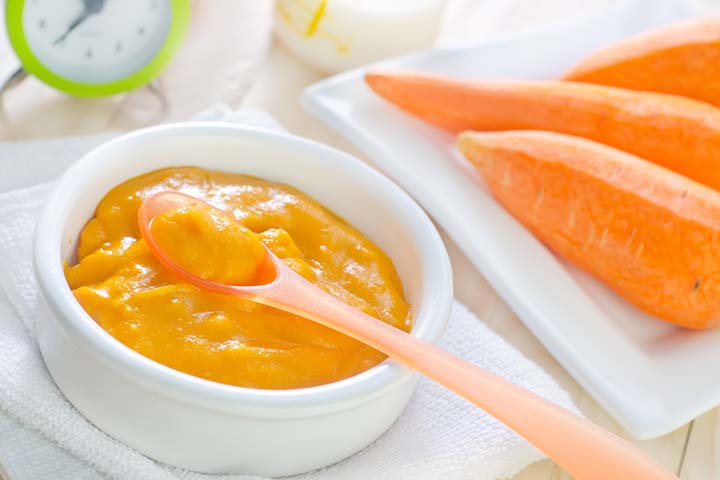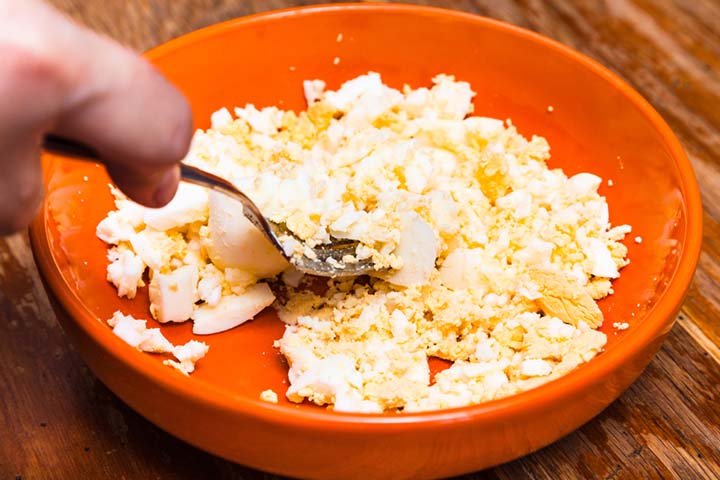After weaning, a baby’s solid food should ideally include food from all major food groups. You can go through some of the best choices of 5 months baby food to introduce to your little one.
According to pediatricians, healthy babies should start their solid food diet by five to six months. The meals should have diversity in them. This will help them get the required nutrition and familiarize themselves with different tastes. Since their immune system is still developing, they need the right nutrients for healthy growth (1).
Keep reading as we have put together a list of ideas for the best food for your five-month-old baby.
Giving Your Baby Right Amount Of Food
Unless your baby has medical conditions that require a specific diet, offering solid foods is suitable at the start of the fifth month (2).
Most parents wait for six months before introducing solid foods to their infants. Sharing her approach to introducing solids to her five-month-old daughter, a mother, Amber says, “She (Amber’s daughter) hasn’t started solids yet, and we don’t plan to until six months, but she is definitely showing a clear interest in food, watching us eat and reaching out for cups, bowls, etc. I’ve been reading up on baby-led weaning and considering it with her when the time comes (i).”
If you intend to introduce solid foods to your baby at five months, do not expect your darling to lick clean her bowl right away! It may take a while since it is a new experience, but soon enough, your baby will adapt to the changing meal type. With time, you can increase the portion as well.
Using the right type of feeding accessories is also important. Soft baby spoons and glasses (preferably made from baby-friendly material) should be used. Some babies take time to understand the chewing and swallowing mechanism and you should not force them to.
Click here to view an enlarged version of this infographic.
Top 5 Ideas For 5 Months Baby Food
Here are our recommendations for solids introduction to your baby (1) (2):
1. Cereals:
When your baby reaches five months, start giving him oatmeal and rice based cereals and porridge. Don’t forget to add breastmilk, formula or water to the cereal, to soften the texture!
- For the first time, avoid using flavored cereals; stick to plain cereals.
- When you see that the baby likes cereal, introduce other variants gradually.
- You can even slightly heat the cereal (just pop it in the microwave!) to make it mushier.
Narrating her journey of introducing cereal to her infant, a mother of two boys says, “My Zd bear (her son) started eating cereal when he was four months old. I tried the grilled rice with monggo, and it’s really good for him (ii).”
2. Fruits:
Fruits are packed with vitamins and 5 months is the right age for your baby to try them.
- At the beginning, fruits should be mashed and slightly cooked before you can offer that to your child.
- You can start giving bananas as they do not need to be cooked or avocados too.
- Make sure you only give ripe and tender fruits to your baby.
Registered dietitian Brittany Beaver says, “At five months old, it is likely your baby won’t be eating large portions, maybe even just one to two tablespoons per day. You can offer a variety of foods such as fruits, vegetables, and proteins in different forms.
“However, per the American Academy of Pediatrics, fruit juice is not recommended for children under one year. Infants have a small stomach, and offering a high-sugar beverage like juice will displace the room they have for more nutrient-dense foods or breast milk/formula.”
3. Vegetables:
Vegetables like potatoes, carrots and papaya can be offered to your baby in cooked form when he reaches the fifth month.
- Ensure the veggies are thoroughly mashed and there is no seed or anything your baby finds difficult to chew or swallow.
- It is not advisable to offer raw vegetables before your darling turns 1 year or more.
- Avoid fibrous vegetables (3).
4. Lean Protein:
Growing babies also need lean protein but you should choose with care.
- Soft and cooked meat like chicken and boneless fish slices can be given.
- Ensure the meat has no bone or sharp bits.
- It is advisable to start your baby on dairy products after he has reached 8 months.
5. Eggs:
Eggs are considered a superfood and one of the best iron-rich foods along with the goodness of vitamin D, both of which are essential for growing children. But can you include eggs into your 5-month-old baby food (4)?
- Until recent years, eggs were not recommended as suitable food for growing babies. However, later the American Academy of Pediatricians lifted the ban on eggs (5).
- Before offering your baby boiled or semi-boiled eggs ensure he or she is comfortable eating other types of solid foods.
- For best results, offer eggs as a meal.
- It’s important to introduce potential allergens like eggs, peanuts, etc., on separate days to detect any protein allergies.
Allergies To Solid Foods
5 month old baby food allergies are not very common, but it can happen. According to data from the CDC’s National Center for Health Statistics (NCHS), around 4.4% of children aged between 0 and 5 years in the US have a food allergy. They may be hereditary or item-based. It may so happen that it is too early to give some particular foods to your baby as well. If you find your baby developing allergic reactions after eating that food, stop feeding and get in touch with a pediatrician (6) (7).
Once the baby is at the age of five months, they would have begun the process of weaning. Thus, it is time to include a set of diverse and nutrient-dense options in your 5-month baby food diet plan. You should also consider the amount of food you can give your baby. The food should be boiled/cooked and mashed so that newborns can consume it without the risk of choking. Certain fruits, vegetables, and cereals can be added as your baby’s first solid food. Moreover, because every baby is different, look out for any allergy symptoms and give your baby time to adapt before introducing a new meal.
Key Pointers
- Introduce mashed and mildly cooked fruits to your baby, such as bananas and avocados.
- Soften oatmeal and rice-based cereals with breast milk, formula, or water for a 5-month-old baby.
- Avoid giving your baby raw vegetables, and give them well-cooked and pureed vegetables like carrots, potatoes, and papaya.
- Once you are certain that the infant is at ease eating solid foods, you can introduce boiled or semi-cooked eggs.
- If you notice adverse symptoms, discontinue feeding and consult a pediatrician.
Check out this amazing video for five delicious and nutritious homemade baby food recipes for 4-6 months old babies! Learn how to make them easily at home.















